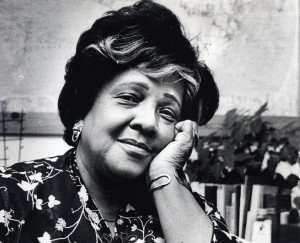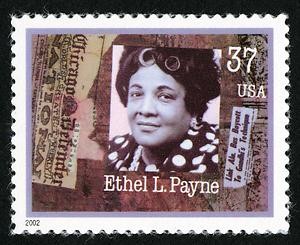
Credit: https://www.washingtonpost.com/opinions/ethel-paynefirst-lady-of-the-black-pressasked-questions-no-one-else-would/2011/08/02/gIQAJloFBJ_story.html
Ethel L. Payne (1911-1991) is known from the Civil Rights Era. Payne was an African-American journalist, Civil Rights leader, educator and publisher. While working at an Army special services club in Japan, Payne was discovered as a writer. Allowing a reporter from the Chicago Defender to read her journal about her experiences and those of African-American soldiers, she was able to kick-start a career for herself in journalism. In the 1950s, she moved back to her home, Chicago. In 1951, she began working full time for the Chicago Defender. In 1954 she also became the chief of the Defender’s Washington bureau.
Throughout her career Payne was able to maintain a balance between being both a journalist and an advocate. Among the various stories and issues she covered include: the Montgomery Bus Boycott; the Nigerian civil war; and in 1966 as a Vietnam war correspondent, she provided coverage of African-American troops. Payne became the first female African-American commentator to be employed by a national network when CBS News hired her in 1972.
Payne died on May 28, 1991 of a heart attack in her home in Washington, D.C. The public can see many of her belongings at the Smithsonian Anacostia Community Museum as well as her awards on display. A stamp honoring Payne was issued in 2002 at a one of the meetings of the National Convention of Professional Journalists. Designed by Fred Otnes, the stamp shows her picture and also a picture of the headline reading “The Alabama Bus Boycott” for a story that she wrote for the Chicago Defender in 1956.
To honor her legacy, biographer James McGrath Morris published the book “Eye on the Struggle: Ethel Payne, the First Lady of the Black Press“on Feb. 17, 2015. In an interview with Gwen Ifill for PBS NewsHour, he discussed his book and how it is possible for one of the most influential journalist activists to be virtually unknown. In the interview, Morris wrote, “And the thing that her not being known today is really a legacy of segregation, in that she was iconic to a large segment of the U.S. population, but, like most black institutions, The Chicago Defender was entirely invisible to white Americans.” The book was reviewed by Dwight Garner of the New York Times.
Payne was able to make herself truly unique in her field through the personal sacrifices she was willing to make. With her dynamic and tireless personality, she was able to tell stories that were left uncovered at a time when white men mainly controlled mainstream press.


Leave a response